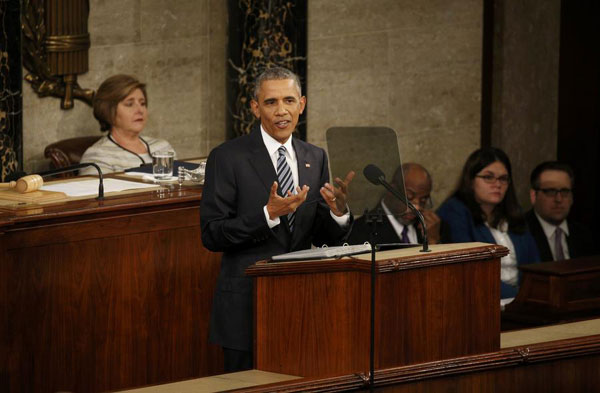Self-glorification in State of Union address ignored US' problems

 |
| US President Barack Obama delivers his State of the Union address to a joint session of Congress in Washington, January 12, 2016. [Photo/Agencies] |
In his last State of the Union address on Tuesday, US President Barack Obama talked about the need to fix domestic politics, but he could not forgo playing politics in a bid to push the US Congress to ratify the Trans-Pacific Partnership agreement.
With strong opposition to the TPP from most of his fellow Democrat lawmakers, Obama seems to believe that fear-mongering about China is a good way to sell the trade agreement reached last Oct 5 by 12 Pacific Rim nations. He did not say, however, that China is actually the largest trading partner for many of these 12 nations.
Obama claimed that "with TPP, China doesn't set the rules in that region, we do". He seems to believe that China, the world's largest trading nation and second-largest economy, should not be included or have a say in making regional and global trade rules.
That is not the type of leadership the world needs or expects from a US president.
When politicians demonize others, they often betray a lack of self-confidence. Obama claimed that "people of the world do not look to Beijing or Moscow to lead - they call us."
To be honest, such a self-glorifying State would not please anybody's ardent supporters because it talked only about his "great" success and hardly anything about his shortcomings or failures, and it only talked about how "great" the US is and hardly anything about the sorry state of the superpower today.
While touting the progress made in cutting the government deficit, Obama did not-mention that the US national debt has surpassed $18 trillion, much of which happened during his presidency.
He claimed that the US has led a coalition of more than 60 countries to fight the Islamic State group, but he did not say that many of the weapons that the IS uses are made in the US and today the terrorists group has spread to more countries. Libya, a disaster created by the Obama administration when it pursued regime change by abusing a 2011 UN Security Council resolution, has gradually become a haven for IS extremists. The US' standing in the Middle East is at its lowest compared with other parts of the world, according to 2015 Pew Center survey.
It was both surprising and ironic to hear Obama proudly claiming that "we spend more on our military than the next eight nations combined". And the Nobel Peace Prize laureate was clearly excited that the US remains by far the world's largest vendor of weapons.
Obama regretted that the rancor and suspicion between the parties has gotten worse instead of better under his presidency. But he did not take any personal responsibility for his often divisive language that has made cooperation and conciliation difficult with the Republicans. There is no doubt that Washington has become increasingly dysfunctional under his presidency, and he has made US-style democracy less appealing in other parts of the world.
As I went to New York Penn Station on Wednesday on my way back to Washington, crowds craned their necks to look at the information screens. They then poured into a narrow entrance to board their trains. During the train ride, you see rusty and dilapidated bridges, rundown buildings and roads with potholes, not to mention that the journey takes three and a half hours, a time that could by half with China's high-speed rail.
This is the picture of a developing country and not the one Obama described on Tuesday night.
The author is deputy editor of China Daily USA. [email protected]

































